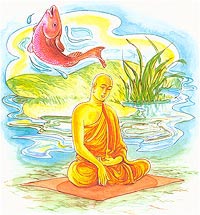12 01 2012
I wish all success to His excellency Barrack Obama continue to rule US, just like Hon’ble Ms Mayawati, the Chief Minister of Uttar Pradesh who is the only CM to complete her full 5 years term with her highly performing best and meritorious governance making politics sacred and hoping her to be the next Prime Minister. Both of them are working for Social Transformation and economic emancipation movement for the entire people.They must join hands for equal distribution of wealth, so that the entire world live with peace, welfare and happiness.
May all be happy, well and secure!
May all have calm, quiet, alert, attentive and have equanimity mind!
With a clear understanding that everything is changing.
I am sure that His excellency is receiving all my mails which works in the above direction and running a FREE ONLINE eNālandā Research & Practice UNIVERSITY Through http://sarvajan.ambedkar.org.
I along with my son Sashikanth Chandrasekharan, who is working in California are well wishers of this great movement.
I wish to state that I wiill be visiting US for the first time and would liketo share our thoughts with His Excellency, if we are permitted to do so.
With Kind regards,
Jagatheesan Chandrasekharan
668 5th A Main Road,
8th Cross
HAL 3rd Stage
Bangalore-560075
Karnataka
India
Mob:9449260443
10 and 11 01 2012 LESSON 490 and 491Verse 32 The Heedful
Advances To Nibbana Verse 33 The Wise Person Straightens The Mind Verse 34 The Fluttering Mind
FREE ONLINE eNālandā Research & Practice UNIVERSITY & BUDDHIST
GOOD NEWS
LETTER through
Through http://sarvajan.ambedkar.org
THE BUDDHIST ON LINE GOOD
NEWS LETTER
COURSE PROGRAM
LESSON
490 and 491
Practice a Sutta a Day
Keeps Dukkha Away
yet to be created. In believing we are a nation, we are cherishing a
great delusion. How can people divided into thousand of castes be a
nation? The sooner we realize that we are not yet a nation, in a social
and psychological sense of the world, the better for us. – Dr B R
Ambedkar
our links:
http://drambedkarbooks.wordpress.com/2012/01/11/i-have-a-dream-for-dalits-of-india/
http://voteforbsp.blogspot.com/
Vote for BSP
Please watch:http://voteforbsp.blogspot.com/2011/10/development-in-uttar-pradesh-thanks-to.html
Development in Uttar Pradesh - Thanks to BSP and Behan Mayawati Ji
‘PIL an Opposition plot’
The Bahujan Samaj Party on Tuesday rubbished as an
Opposition conspiracy a public interest litigation petition filed in the
Allahabad High Court challenging the Election Commission order on
covering of the statues of elephants (BSP’s symbol).
In
a statement, BSP general secretary Satish Chandra Mishra said
petitioner Dheeraj Ptratap Singh was a native of Allahabad, where no
elephant statues have been erected. He said his party would not
challenge the “un-constitutional” and “unlawful” order of the EC in a
court of law but would take it before the people’s court.
Mr.
Mishra reiterated that the EC order on draping the statues of BSP
president Mayawati and of elephants was one-sided and the party’s view
had not been taken into account.
consequence of alcohol-induced hallucination, but as one drives along
the Rashtriya SC/ST/OBC Prerna Sthal in Noida that houses among others a
statue of Uttar Pradesh Chief Minister Mayawati, rows of pink elephant
statues pop into sight from inside and around the periphery of the
famous park.
These elephant statues are being draped in pink, because of a recent
Election Commission (EC) directive, to conceal all statues of Uttar
Pradesh Chief Minister and elephants (symbol of the Bahujan Samaj Party ?







Workers cover elephant statues at a park in Noida on the outskirts of New Delhi on Tuesday

but not Congress Hand, SP’s Cycle, BJP’s National Flower Lotus, Hand pump, Sickle with Hammer or Star)
before January 11. And pink is the colour of choice, not because it is
believed to be Ms. Mayawati’s favoured colour, but because it does not
represent any party’s official colour.
Curious onlookers
On Tuesday, as hundreds of men struggled with yards of pink plastic to
drape all the elephants inside the park, and outside, vehicles crawled
to a stop as curious onlookers watched in amusement. From pizza delivery
boys to labourers, from random passers by to media crews, the audience
watched as men raced against time to obey the diktat of the EC.
Guards posted at the gates of the multi-crore park ensured that no one
apart from the authorised workforce was allowed to enter. Officials in
charge of the work were reluctant to answer questions, but some of the
labourers at the site shared helpful pointers. “Lots of men are working
and by tomorrow [Wednesday] you will see every elephant statue, even the
tiny ones on the fountains, covered,” said Navneet Kumar, a guard
posted at one of the entrances of the park.
Kanshi Ram and Dr. B.R. Ambedkar stand, work is under way to cover the
Chief Minister’s statue. Surrounded by scaffolding, wooden planks have
been stacked to conceal Ms. Mayawati’s statue. Once the work is over,
the wooden planks will be covered with cloth.
There are over 50 elephants, big and small, and all of them will have to
be covered in pink plastic, while Ms. Mayawati’s statues will be
covered with a more respectable option — cloth. The ‘mammoth’ exercise
of covering the statues has left a lot of people befuddled; while some
think the park is being shut down, others think it is a waste of public
money and effort, and to some others it is the work of “politicians and
the media.”
Bharatiya Janata Party (BJP)has found itself at the centre of controversy after recruiting two state politicians accused of corruption and subsequently sacked by Ms Mayawati.
When BSP once again gains control of the state government, headquartered in the elegant city of Lucknow, the prize is considerable; with apopulation of about 170 million, Uttar Pradesh returns 80 members to the national assembly, more than any other state. Eight of the 12 individuals who have held the office of Prime Minister have hailed from here and Uttar Pradesh exercises an unparalleled influence on national politics.Now it is the turn of Ms Mayawati who as Chief Minister was the only one who made a record of full five term in office. And she will repeat the record by becoming the next Prime Minister of PraBuddha Bharath.
Therefore,the Congress Party cannot stop Ms Mayawati from securing the chief minister’s office for the fifth time. Of the 403 assembly seats, it just holds just 22.
The Congress and the BJP with their allies ruled the country for 65 years. But 42 % of country’s children under-fives are severly under-weight and that 59% of them suffer from severe stunting, meaning their height is much lower than the median height-for-age of the reference population i.e., malnourished.
VOICE OF SARVAJAN
D. Raja disagrees with EC order
The Election Commission should take adequate steps to
provide a level playing field to all parties in the coming Assembly
elections in five States, national secretary of the Communist Party of
India D. Raja said.
He, however, disagreed with the
Commission’s order to veil the statues of Uttar Pradesh Chief Minister
Mayawati and of elephant, her party symbol.
The decision was irrational, he said at a press conference here on Tuesday.
Such a step by the EC would lead to a series of problems, including the allocation of symbols.
Reacting
to the EC’s response that those who criticised the decision were
“ill-informed,” he said: “In the same yardstick, will the EC also order
the cover up of other symbols such as hand, cycle and hand pump.”
The
CPI considered the coming elections as very important. The Commission should ensure that elections were held in a free
and fair manner.
BSP Supremo Mayawati who sits atop a huge vote bank made up of the poorest and most oppressed has done wonders in UP from 2007 till this date. It will do much better from 2012 onwards by winning 303 seats.
By uniting SC/STs/OBCs/Minorities and the poor upper casteswith its policy of Sarvajan Hitrhay sarvajan Sukhay i.e., for the welfare and happiness of entire people Ms mayawati’s BSP Elephant offers power to the to people who weren’t politically empowered.
It was the ever creamy of rich people who enjoys the fruits of power in the name of Congress, BJP and their allies.
Now in UP Kushwahas, Yadavs, Kurmis, Nishads,Noniyas,Paswans,Jatavs, Ms Mayawati was the first to consolidate their support base through policy decision when she became CM. She created quota in civic bodies for tghis Maha SC/ST/OBC Minorities and the poor upper castes, implemented health schemes for them and alloted them land with water though that was not constitutionally feasible to offer special quota with in quota for either SC/ST or OBC. She offered then Assembly seats and position of power in Panchayats and other local bodies..
This consumate action helps her to win 303 seats. This Maha SC/ST/OBC/Minorities/Poor upper castes have no loyalty to any other parties such as Congress, BJP, SP because nobody ever cared about them.
will address four rallies in Punjab on January 21
and 22 to woo voters, even as the party hopes to fare better in the
state assembly elections on January 30.
BSP MP and national general secretary Narender Kashyap said the Uttar Pradesh chief minister will address rallies at Kharar in Mohali and in Nawanshahar on January 21.
On the next day, she will address meetings in Muktsar and at Chhapar in Sangrur districts.
Kashyap said his party would make significant gains in the Punjab polls.
The party released a list of 21 candidates in addition to the names for 90 candidates announced earlier for the 117-member House






Nation is Elephant
 of BSP!
of BSP!with Congress, other regional parties and BJP!
Key !
POLITICS IS SACRED WITH HIGHLY PERFORMING BEST AND MERITORIOUS
GOVERNANCE OF UP CM FULLY AWAKENED WITH AWARENESS MAHA MAYAWATIJI WHO IS THE
ONLY CM SUCCESSFULLY COMPLETED HER FULL TERM WHO WILL WIN WITH A THUMPING
MAJORITY OF 303 IN THE NEXT ELECTION AND ULTIMATELY BECOME THE PM OF PRABUDDHA
BHARATH.Since Mayawati’s trusted core group includes upper caste aides and
advisers. Small-time traders, the classical petit-bourgeoisie, Mayawati is
determination to count herself in as a mass messiah. The BSP is the only party
that speaks of Sarvajan Hithay Sarvajan Sukhay i.e., welfare and happiness of
the entire people.Please visit http://sarvajan.ambedkar.org for details.
|
|
Verse 32. The Heedful The Explanation: Dhammapada Appamadarato bhikkhu Verse 1. abhabbo The While Nigamavasitissa Some Once Much The Then the Buddha spoke in verse as follows:
At * End § 61. {Iti 3.12; Iti 52} This was said by the The eye of flesh, the eye divine, the eye of |
|
|
|
Verse 33. The Wise Person Straightens The Mind Mind agitated, wavering, Explanation: In the |
|
|
Verse 34. The Fluttering Mind As fish from watery Explanation: When Dhammapada Verses 33 Phandanam capalam Varijova thale Verse 33: The mind Verse 34: As a fish 1. durakkham: difficult 2. dunnivarayam: difficult 3. ujum karoti: The Story of Thera While residing on At that time, Thera Thus, Thera Meghiya So, the Buddha told Then the Buddha spoke in verse as follows:
At the end of the § 62. {Iti 3.13; Iti 52} This was said by the For a learner in Notes 1. According to the Commentary, the first of these faculties 2. Such (tadi): see the note to §44. § 63. {Iti 3.14; Iti 53} This was said by the Perceiving in terms Note 1. At first glance, the verses here do not bear much relationship |



